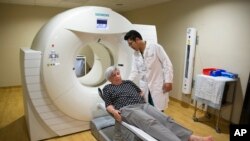According to the Alzheimer's Association, an estimated 47 million people worldwide have been diagnosed with Alzheimer's disease, a neurodegenerative condition that causes severe dementia.
But researchers — originally at the University of Leicester in England, but now at the University of Glasgow in Scotland — have found a new class of drug that not only slows memory loss, but appears to restore it and to extend life in a mouse model of Alzheimer's.
The drug, called allosteric ligands, targets a protein that is involved with memory.
As patients with Alzheimer's deteriorate, the protein in a brain region called the hippocampus becomes less active.
However, the experimental drug appears to activate the protein, called the M1 muscarinic receptor, which improves memory.
Andrew Tobin, professor of molecular biology at the University of Glasgow, is lead author of the work, which was published in the Journal of Clinical Investigation.
For reasons that are not entirely clear, Tobin says the drugs also extended the life of the mice.
"[The drug is] still going through this [memory protein], but it's doing something else in the brain which is protecting the neurons from neurodegeneration,” he said. “And the big question that we have in the lab is, ‘What is that mechanism? What is the biochemical mechanism that underlies that response?’ And, of course, that's the next thing we'll be looking at."
Current treatments for Alzheimer's disease are designed to ease symptoms, while researchers say their work represents an actual treatment.
The experimental compound was tested in a mouse model of Alzheimer's. The animals were bred to exhibit signs of mad cow disease, which looks similar to Alzheimer's in humans in terms of memory loss, progression and death.
On a memory test, the untreated mice were unable to recall receiving a mild electric shock, while the treated mice did remember the stimulus.
Tobin cautions that a drug is probably five to 10 years away.
"These advances take us forward a step at a time,” he said. “So whereas they do give a lot of hope, … it's not an immediate cure.”









